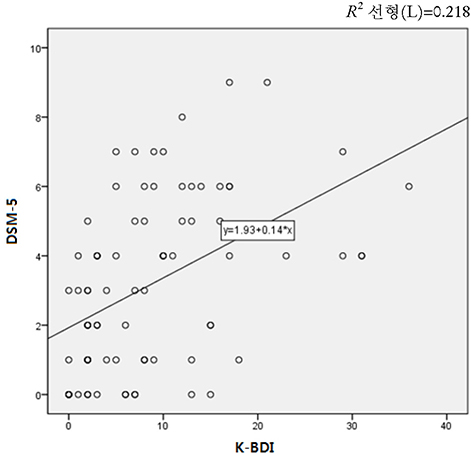Korean J Health Promot.
2018 Jun;18(2):71-82. 10.15384/kjhp.2018.18.2.71.
Relationship between Horse Racing Addiction and Health Status Indicators
- Affiliations
-
- 1Department of Family Medicine, Bundang Jesaeng Hospital, Seongnam, Korea. grchoi1@dmc.or.kr
- KMID: 2415939
- DOI: http://doi.org/10.15384/kjhp.2018.18.2.71
Abstract
- BACKGROUND
The purpose of this study is to investigate relationship between the horse racing addiction and the health status indicators.
METHODS
Surveys were conducted with visitors of the Korea Racing Association in Gyeonggi-do, from September 1 to September 24, 2017. We used the questionnaire, which contains questions to assess the horse racing addiction, mood depression, health-related quality of life, smoking amount, alcohol dependency, etc. Survey data were analyzed through t-test, chi-square test, logistic regression analysis, and multiple regression analysis by SPSS program (IBM Corp., Chicago, IL, USA).
RESULTS
The pathological gambling group was 47.5% (n=38) of the visitors, and they showed a different racecourse use behavior compared to the normal group. In addition, we found that the pathological gambling group had a significantly different health-related quality of life score and a depression score from the normal group, and that the addiction score and the depression score had a linear correlation.
CONCLUSIONS
Among the racecourse visitors, the ratio of the pathological gambler was considerably high, and the pathological gambling group showed different health-related quality of life score and a depression score compared to the normal group; especially, the depression score has a significant correlation with horse racing addiction. Therefore, the horse racing association and the health authorities should recognize the seriousness of the horse racing addiction, make an effort to select high risk users, and prepare a program to prevent pathological gambling.
MeSH Terms
Figure
Reference
-
1. Lee DJ. The relationship among gambling motives, irrational gambling belief, gambling addiction and social adaptation of racing sports participants [dissertation]. Seoul: The Graduate School of Sungkyunkwan University;2007. Korean.2. Dickerson MG, Baron E, Hong SM, Cottrell D. Estimating the extent and degree of gambling related problems in the Australian population: A national survey. J Gambl Stud. 1996; 12(2):161–178.
Article3. Ladouceur R, Walker M. A cognitive perspective on gambling: Trends in cognitive and behavioural therapies. 1st ed. New York: John Wiley & Sons Ltd;1996. p. 89–120.4. McCormick RA, Taber JI. The pathological gambler: Salient personality variables. The handbook of pathological gambling. 1st ed. Illinois: Charles C Thomas Pub Ltd;1987. p. 9–39.5. Lesieur HR, Rosenthal RJ. Pathological gambling: a review of the literature (prepared for the American Psychiatric Association task force on DSM-IV committee on disorders of impulse control not elsewhere classified). J Gambl Stud. 1991; 7(1):5–39.
Article6. Lee BO, Lee CH, Lee PG, Choi MJ, Namkoong K. Development of Korean version of alcohol use disorders identification test (AUDIT-K) its reliability and validity. J Korean Acad Addict Psychiatry. 2000; 4(2):83–92.7. Kim SH, Kim HJ, Lee SI, Jo MW. Comparing the psychometric properties of the EQ-5D-3L and EQ-5D-5L in cancer patients in Korea. Qual Life Res. 2012; 21(6):1065–1073.
Article8. Kim SH, Ahn J, Ock M, Shin S, Park J, Luo N, et al. The EQ-5D-5L valuation study in Korea. Qual Life Res. 2016; 25(7):1845–1852.
Article9. Beck AT. Depression: clinical, experimental, and theoretical aspects. 1st ed. New York: Hoeber Medical Division, Harper & Row;1967. p. 345–359.10. Lee YH. The relations between attributional style, life events, event attribution, hopelessness and depression [dissertation]. Seoul: Seoul National University;1993. Korean.11. Lee HP, Kim DJ, Sung SK, Yang IH, Go HJ. The psychological and behavioral characteristics of the pathological gamblers in horse racing. J Korean Neuropsychiatr Assoc. 2000; 39(1):46–54.12. Heo JH. An analysis of gambling participant addiction: The case of Seoul horse racing park [dissertation]. Suwon: Kyonggi University;2001. Korean.13. Park SE. An analysis of satisfaction degree of horse racing participant between the sound and the addicted. [dissertation]. Suwon: Kyonggi University;2002. Korean.14. Jeon JS. An exploratory study of comorbidity between gambling disorder and alcohol use disorder: the case of off-track betting place of horse racing users [dissertation]. Bucheon: Catholic University;2017. Korean.15. Song KY. The relationship between degree of participation in horse racing and addiction, social adaption. Korean J Sociol Sport. 2001; 14(2):601–615.16. Rhee MK, Kim KH, Kim CN. Prevalence estimates, demographics and psychosocial characteristics of pathological gamblers: focusing on comparing two communities in Korea. Korean J Health Psychol. 2003; 8(2):399–414.
- Full Text Links
- Actions
-
Cited
- CITED
-
- Close
- Share
- Similar articles
-
- The Psychological and Behavioral Characteristics of the Pathological Gamblers in Horse Racing
- The Mental Health and Occupational Characteristic of Horse Stable Hand Workers in Korea
- Examining Antecedents and Consequences of Gambling Passion: The Case of Gambling on Horse Races
- Association of Internet Addiction with Health Promotion Lifestyle Profile and Perceived Health Status in Adolescents
- A cross-sectional study of colic and rate of return to racing in Thoroughbreds at Seoul Racecourse in Korea between 2010 and 2020


